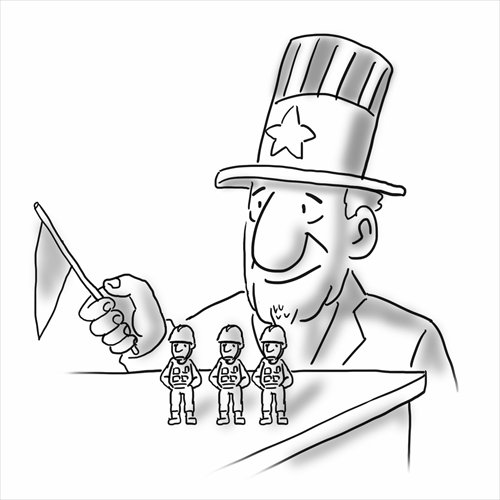US eager to see allies play stronger role through renewed Guam doctrine

Illustration: Liu Rui/GT
The President of Washington-based think tank Economic Strategy Institute Clyde Prestowitz has argued in his latest book that, instead of depending on the US for its defense, Japan should seek out a security alliance with other Asian countries. Given its defense budget cuts, the White House is expected to reduce its presence in the Asia-Pacific region, and thus will be a "call of second resort" for Tokyo, Prestowitz claimed.
Prestowitz's suggestions are representative of mainstream views in the US. In fact, Washington has been devoting tremendous efforts to promoting Tokyo's defense ties with other Asian countries for years.
Since 2010, the White House has spared no efforts in facilitating the negotiations over the General Security of Military Information Agreement and the Military Acquisition and Cross-Servicing Agreement between Japan and South Korea. Yet the two deals were put on hold in 2012 as the former South Korean president Lee Myung-bak faced strong domestic opposition before signing the agreements.
The US wants to establish a security network pivoted by Japan, South Korea, the Philippines, Australia, as well as its other allies in East Asia. This military alliance, with Tokyo at the core, would share Washington's responsibilities and underwrite defense in the region.
To be more precise, this is an updated Guam Doctrine for a new era, an idea first put forward by the former US president Richard Nixon in 1969. The concept of the doctrine is that each ally country should take charge of its own security, while the US plays a role as a nuclear umbrella and assists in the defense of the allies when requested.
Yet still, although the White House is expected to gradually reduce its presence in the Asia-Pacific region, it will not give up too much power to Tokyo. With declining clout in the region, the White House is encouraging its allies to undertake more responsibilities. Yet, it will not allow Japan to dominate the Asia-Pacific region.
The Japanese government, on the other hand, will definitely dance to the US tune. The nation, backed up by Washington, not only negotiated with South Korea over the military agreements, but also stirred up troubles in the East China Sea and South China Sea in recent years. Tokyo will further upgrade its interventions in the South China Sea where the Japanese government is still waiting for opportunities to send ships on patrol.
It is highly likely that Japan will first strengthen its military contacts with countries that have territorial disputes with China, for instance, Vietnam, the Philippines and Malaysia, in order to balance Beijing. Besides, hoping to infiltrate its clout into the Korean Peninsula, Japan has long attempting to get closer to South Korea as well.
Yet, South Korea is reluctant to become too intimate with Japan. In the first place, the squabbles between the two countries on history, especially on the issue of "comfort women," have been simmering for years. The bilateral territorial disputes have not been addressed either. In addition, China is another important factor in the Seoul-Tokyo relationship. Seoul is cautious in handling with its relations with Tokyo, so as not to offend Beijing.
However, this does not mean the possibility of closer South Korea-Japan relations can be ruled out. The White House has been constantly pressuring Seoul to build better ties with Tokyo, and thus the two nations are likely to become closer bit by bit.
Seoul and Tokyo have strengthened military communications in recent years, for instance, joint military exercises involving the US, Japan and South Korea, the negotiation on the military information sharing agreements and so forth. Despite this slow progress, the two nations are growing closer on military issues.
The author is a professor at China Foreign Affairs University. opinion@globaltimes.com.cn